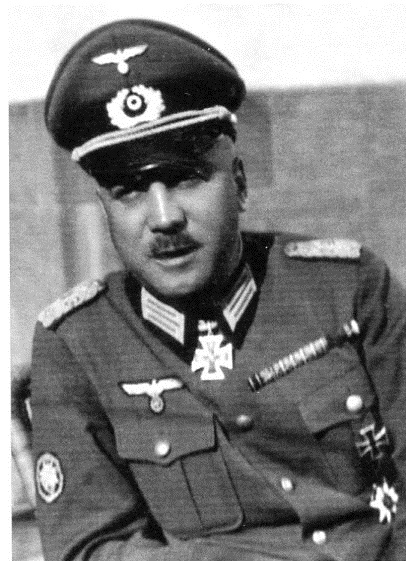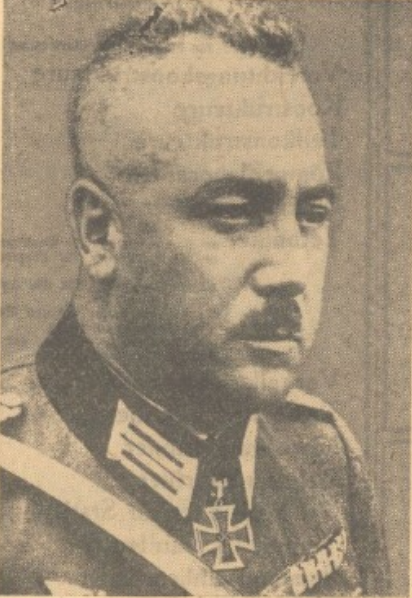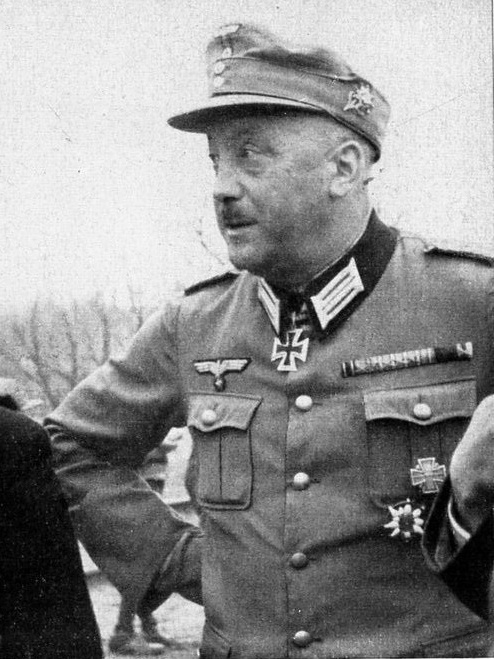No edit summary Tag: Visual edit |
No edit summary Tag: Visual edit |
||
| Line 1: | Line 1: | ||
{{Infobox person|name=August Sorko|image=August Sorko 2.jpg|birth_date=8 August 1891|birth_place=[[Klagenfurt]], [[The Kingdoms and Lands Represented in the Imperial Council (1867–1918)|Cisleithania]], [[Austro-Hungarian Monarchy (1867–1918)|Austria-Hungary]]|death_date=19 July 1941 (aged 49)|death_place=[[Makhnivka | {{Infobox person|name=August Sorko|image=August Sorko 2.jpg|birth_date=8 August 1891|birth_place=[[Klagenfurt]], [[The Kingdoms and Lands Represented in the Imperial Council (1867–1918)|Cisleithania]], [[Austro-Hungarian Monarchy (1867–1918)|Austria-Hungary]]|death_date=19 July 1941 (aged 49)|death_place=[[Makhnivka, Khmilnyk Raion, Vinnytsia Oblast|Komsomolske]], [[Ukrainian Soviet Socialist Republic (1919–1991)|Ukrainian SSR]], [[Union of Soviet Socialist Republics (1922–1991)|Soviet Union]]|death_cause=|nationality=Austrian<br>German}} | ||
'''Franz August Sorko''' (8 August 1891 – 19 July 1941) was an [[Austro-Hungarian Monarchy (1867–1918)|Austrian]] lieutenant colonel who served in the [[Wehrmacht]] during [[Second World War|World War II]]. He participated in the [[German invasion of Poland|German invasions of Poland]] (1939), [[Operation Weserübung|Norway]] (1940), and the [[Operation Barbarossa|Soviet Union]] (1941) as the commander of the 2nd Battalion ( | '''Franz August Sorko''' (8 August 1891 – 19 July 1941) was an [[Austro-Hungarian Monarchy (1867–1918)|Austrian]] lieutenant colonel who served in the [[Wehrmacht]] during [[Second World War|World War II]]. He participated in the [[German invasion of Poland|German invasions of Poland]] (1939), [[Operation Weserübung|Norway]] (1940), [[Invasion of Yugoslavia|Yugoslavia]] (1941), and the [[Operation Barbarossa|Soviet Union]] (1941) as the commander of the 2nd Battalion (nicknamed the "Sorko Group" or the "Sorko Battalion") of the [[137th Mountain Jäger Regiment]].<ref>https://www.lexikon-der-wehrmacht.de/Gliederungen/Gebirgsjagerregimenter/GJR137-R.htm</ref> Sorko died on the [[Eastern Front (World War II)|Eastern Front]] on 19 July 1941, almost a month into Operation Barbarossa.<ref name=":0">{{Web citation|author=|newspaper=[[Völkischer Beobachter]]|title=Gau Kärnten|date=1941-08-01|url=https://anno.onb.ac.at/cgi-content/anno?aid=vob&datum=19410801&seite=5&zoom=33|archive-url=https://web.archive.org/web/20230201054250/https://anno.onb.ac.at/cgi-content/anno?aid=vob&datum=19410801&seite=5&zoom=33|archive-date=2023-02-01|retrieved=2023-02-01}}</ref> Afterwards his death was used by the [[National Socialist German Workers' Party|Nazis]] for propaganda purposes.<ref name=":1">{{Web citation|newspaper=Völkischer Beobachter|title=August Sorko, der Sieger von Helemoboten|date=1941-07-30|url=https://anno.onb.ac.at/cgi-content/anno?aid=vob&datum=19410730&seite=5&zoom=33|archive-url=https://web.archive.org/web/20240407150056/https://anno.onb.ac.at/cgi-content/anno?aid=vob&datum=19410730&seite=5&zoom=33|archive-date=2024-04-07|retrieved=2024-04-07}}</ref> | ||
== Life == | |||
Franz August Sorko was born on 8 August 1891 in Klagenfurt, Austria-Hungary. He was the son of a merchant.<ref name=":1" /> | |||
Sorko joined the [[4th Landwehr Infantry Regiment]] on 10 October 1912 at the age of 21. During [[First World War|World War I]], he fought in [[Galicia (Eastern Europe)|Galicia]] and later on the [[Italian front (World War I)|Italian front]], where he took a shot to the lung. In 1915 he was promoted to ''Leutnant'' and in 1916 ''Oberleutnant''. He was awarded several medals for his bravery and leadership during the war, including the [[Medal for Bravery (Austria)|Silver Medal for Bravery (1st class)]] and the [[Imperial Order of the Iron Crown|Order of the Iron Crown (3rd class)]].<ref name=":1" /> | |||
After the war, Sorko fought in the [[Austro-Slovene conflict in Carinthia]], leading his men to victory in [[Ferlach]], [[Sankt Margareten im Rosental]], and [[Eisenkappel]]. For this he was awarded the [[Carinthian Cross|Carinthian Cross for Bravery]]. In 1921 he was promoted to ''Hauptmann'' and later he was promoted to ''Major''.< After the [[Anschluss]], Sorko joined the [[Wehrmacht]], leading the newly-formed 137th Mountain Jäger Regiment. That same year, Sorko, now an ''Oberstleutnant'', took part in the [[Occupation of Czechoslovakia (1938–1945)|occupation of the Sudetenland]].<ref name=":1" /> | |||
During the Polish Campaign, Sorko fought at the [[Battle of Lwów (1939)|Battle of Lwów]], where he distinguished himself, earning the [[Iron Cross]], 1st and 2nd class. Sorko proved himself once again at the [[Battle of Narvik]] in [[Kingdom of Norway|Norway]], for which he was awarded the [[Knight's Cross of the Iron Cross]]. In 1941 he was promoted to ''Oberst''. He participated in the attack on Yugoslavia from [[Tsardom of Bulgaria (1908–1946)|Bulgaria]].<ref name=":1" /> He was later promoted to ''Oberstleutnant''. | |||
Sorko took part in Operation Barbarossa. He died in [[Makhnivka, Khmilnyk Raion, Vinnytsia Oblast|Komsomolske]] on 19 July 1941. | |||
==Gallery== | ==Gallery== | ||
| Line 12: | Line 23: | ||
[[Category:1941 deaths]] | [[Category:1941 deaths]] | ||
[[Category:People from Klagenfurt]] | [[Category:People from Klagenfurt]] | ||
[[Category:Recipients of the Imperial Order of the Iron Crown (3rd Class)]] | |||
[[Category:Recipients of the Iron Cross (1939), 1st class]] | [[Category:Recipients of the Iron Cross (1939), 1st class]] | ||
[[Category:Recipients of the Iron Cross (1939), 2nd class]] | [[Category:Recipients of the Iron Cross (1939), 2nd class]] | ||
[[Category:Recipients of the Knight's Cross of the Iron Cross]] | [[Category:Recipients of the Knight's Cross of the Iron Cross]] | ||
[[Category:Recipients of the | [[Category:Recipients of the Silver Medal for Bravery (Austria), 1st class]] | ||
Revision as of 17:28, 7 April 2024
August Sorko | |
|---|---|
 | |
| Born | 8 August 1891 Klagenfurt, Cisleithania, Austria-Hungary |
| Died | 19 July 1941 (aged 49) Komsomolske, Ukrainian SSR, Soviet Union |
| Nationality | Austrian German |
Franz August Sorko (8 August 1891 – 19 July 1941) was an Austrian lieutenant colonel who served in the Wehrmacht during World War II. He participated in the German invasions of Poland (1939), Norway (1940), Yugoslavia (1941), and the Soviet Union (1941) as the commander of the 2nd Battalion (nicknamed the "Sorko Group" or the "Sorko Battalion") of the 137th Mountain Jäger Regiment.[1] Sorko died on the Eastern Front on 19 July 1941, almost a month into Operation Barbarossa.[2] Afterwards his death was used by the Nazis for propaganda purposes.[3]
Life
Franz August Sorko was born on 8 August 1891 in Klagenfurt, Austria-Hungary. He was the son of a merchant.[3]
Sorko joined the 4th Landwehr Infantry Regiment on 10 October 1912 at the age of 21. During World War I, he fought in Galicia and later on the Italian front, where he took a shot to the lung. In 1915 he was promoted to Leutnant and in 1916 Oberleutnant. He was awarded several medals for his bravery and leadership during the war, including the Silver Medal for Bravery (1st class) and the Order of the Iron Crown (3rd class).[3]
After the war, Sorko fought in the Austro-Slovene conflict in Carinthia, leading his men to victory in Ferlach, Sankt Margareten im Rosental, and Eisenkappel. For this he was awarded the Carinthian Cross for Bravery. In 1921 he was promoted to Hauptmann and later he was promoted to Major.< After the Anschluss, Sorko joined the Wehrmacht, leading the newly-formed 137th Mountain Jäger Regiment. That same year, Sorko, now an Oberstleutnant, took part in the occupation of the Sudetenland.[3]
During the Polish Campaign, Sorko fought at the Battle of Lwów, where he distinguished himself, earning the Iron Cross, 1st and 2nd class. Sorko proved himself once again at the Battle of Narvik in Norway, for which he was awarded the Knight's Cross of the Iron Cross. In 1941 he was promoted to Oberst. He participated in the attack on Yugoslavia from Bulgaria.[3] He was later promoted to Oberstleutnant.
Sorko took part in Operation Barbarossa. He died in Komsomolske on 19 July 1941.
Gallery


References
- ↑ https://www.lexikon-der-wehrmacht.de/Gliederungen/Gebirgsjagerregimenter/GJR137-R.htm
- ↑ "Gau Kärnten" (1941-08-01). Völkischer Beobachter. Archived from the original on 2023-02-01. Retrieved 2023-02-01.
- ↑ 3.0 3.1 3.2 3.3 3.4 "August Sorko, der Sieger von Helemoboten" (1941-07-30). Völkischer Beobachter. Archived from the original on 2024-04-07. Retrieved 2024-04-07.